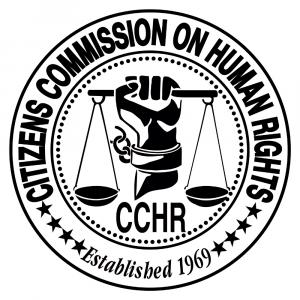Black patients are 85% more likely to be restrained and for a longer period of time, according to new research.

The World Health Organization and UN Office of High Commissioner for Human Rights issued guidance on ending all coercive practices in mental health services because research shows it can worsen a person’s condition.

Citizens Commission on Human Rights has called on the American Psychiatric Association to formally endorse an end to coercive psychiatric practices.
Researchers suggest the racial disparity may be evidence of systemic racism in psychiatry, call for measures to reduce the use of restraints.
— Sonali Singal, B.S., Feinstein Institutes for Medical Research, New York
WASHINGTON, DC, US, November 7, 2023 /EINPresswire.com/ — Black psychiatric patients are more likely to be physically, mechanically, or chemically restrained in a psychiatric facility and for a longer time than White in-patients, a new study shows.
Using medical records of nearly 30,000 teens and adults who received in-patient psychiatric treatment between 2012 and 2019, researchers found that Black patients were 85% more likely to be restrained than their White counterparts. Multiracial patients were 36% more likely than Whites to be restrained. Black patients were also restrained for a longer period of time.
Restraint was defined as a physical or mechanical hold in which patients were unable to move their limbs, body or head or were administered drugs to restrict their movement.
“The findings indicate racial disparities in the frequency and duration of restraint events among Black and multiracial individuals,” wrote lead author Sonali Singal, B.S., at the Institute of Behavioral Science, Feinstein Institutes for Medical Research, in Manhasset, New York. The study was published in Psychiatric Services.
The researchers suggest this racial disparity may be evidence of systemic racism in psychiatry and called for measures to address racial bias and reduce the use of restraints.
Recently, the World Health Organization (WHO) and the United Nations Office of the High Commissioner for Human Rights (OHCHR) issued new guidance on ending all coercive practices in mental health services worldwide, citing research that such nonconsensual treatment negatively impacts physical and mental health and can worsen a person’s condition. Coercive practices include involuntary detention, restraints, seclusion, forced drugging, and involuntary electroshock.
Following the publication of the WHO guidance, the Citizens Commission on Human Rights (CCHR), a mental health watchdog organization, delivered an open letter to the American Psychiatric Association, calling on the organization to issue a formal statement endorsing an end to coercive psychiatric practices.
Other research indicates systemic racism in the mental health system. A 2022 study found that Black patients who go to hospital emergency rooms for mental health issues are significantly more likely to be restrained chemically, typically by means of an antipsychotic drug. “You are 63% more likely, for the same set of chief complaints, to be chemically sedated if you are Black versus if you’re White,” a senior investigator connected with the study reported. [1]
A 2022 report from the Substance Abuse and Mental Health Services Administration (SAMHSA) on the use of mental health services operated or funded by state mental health agencies also showed evidence of systemic racism in the U.S. mental health system. African Americans received disproportionately more diagnoses of mental disorders related to disruptive, defiant, and psychotic behavior and disproportionately more mental health treatment for behavioral issues than other racial and ethnic groups. [2]
Systemic racism was finally acknowledged in a public apology in 2021 by the American Psychiatric Association (APA), in which the APA admitted psychiatrists’ role “in perpetrating structural racism” and confirmed that psychiatrists’ “appalling past actions, as well as their harmful effects, are ingrained in the structure of psychiatric practice.” [3]
The American Psychological Association issued its own public apology in 2021 for the “racism, racial discrimination, and denigration of people of color” committed by psychologists, after compiling what it called “a stunning chronology” of psychology’s history of racism. The apology acknowledges the role of psychologists “in promoting, perpetuating, and failing to challenge racism, and the harms that have been inflicted on communities of color as a result.” [4]
Since its founding in 1969 as a human rights organization and mental health industry watchdog, the Citizens Commission on Human Rights has exposed and campaigned against racism and racial abuse in the mental health system. CCHR intensified its efforts in 2020 by forming the CCHR Task Force Against Psychiatric Racism and Modern-Day Eugenics, led by Rev. Fred Shaw, Jr. Its mission is to investigate and combat institutional racism and inform and empower the African American community with the facts about racism masked as mental health care. [5]
CCHR has also worked with the NAACP since 2003 in exposing the stigmatizing labeling and drugging of African American children and, with Rev. Shaw, in obtaining the three national NAACP resolutions related to these issues.
The Citizens Commission on Human Rights was co-founded in 1969 by members of the Church of Scientology and the late psychiatrist and humanitarian Thomas Szasz, M.D., recognized by many academics as modern psychiatry’s most authoritative critic, to eradicate abuses and restore human rights and dignity to the field of mental health. CCHR has been instrumental in obtaining hundreds of laws against psychiatric abuse and violations of human rights worldwide.
The CCHR National Affairs Office in Washington, DC, has advocated for mental health rights and protections at the state and federal level. The CCHR traveling exhibit, which has toured major cities worldwide and educated people on the history to the present day of abusive and racist psychiatric practices, has been displayed at the Congressional Black Caucus Foundation Annual Legislative Conference in Washington, DC, and at other locations.
[1] https://pubmed.ncbi.nlm.nih.gov/35227925/
[2]
[3]
[4] https://www.apa.org/about/policy/racism-apology
[5] https://www.cchrtaskforce.org/
Anne Goedeke
Citizens Commission on Human Rights, National Affairs Office
+1 202-349-9267
email us here
Reverend Fred Shaw—The Fight For Human Rights in Mental Health
![]()
Article originally published on www.einpresswire.com as CCHR Warns New Study Indicates Black Patients in Psychiatric Facilities More Likely to Be Restrained and For Longer





